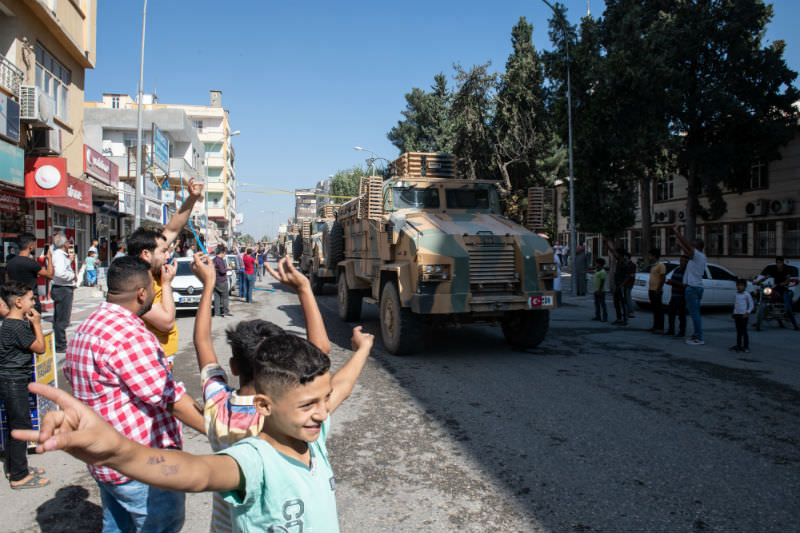The Kurds share with the Jews a certain common ground. They have been, at stages of their history, promised and betrayed. Homelands have been sketched out on maps redrawn by great powers. But while the Jews did eventually find Israel, the Kurds continue to fight for an autonomous bit of earth they can call home.
 There
have been incipient efforts to create a homeland. Kurdistan arose
within the borders of Iraq in the 1920s, but it was an exercise of
brutal brevity. While the self-declared Kurdish Republic of Ararat did
have some life, it was, in time, crushed. Great Britain and France toyed
and teased with borders and boundaries.
There
have been incipient efforts to create a homeland. Kurdistan arose
within the borders of Iraq in the 1920s, but it was an exercise of
brutal brevity. While the self-declared Kurdish Republic of Ararat did
have some life, it was, in time, crushed. Great Britain and France toyed
and teased with borders and boundaries.By the 1950s, the United States had announced that it, too, could play a part in the game of Kurdish betrayal. Iraqi Kurds, for instance, were given encouragement by Washington during the ill-fated rule of Abd al-Karim Qasim. Kassem's regime fell in a 1963 military coup, one, incidentally, marked by a significant hand from Iraq's future bloodthirsty ruler, Saddam Hussein. With the US objective of Kassem's removal achieved, support for the Kurdish resistance was withdrawn.
Of all the chapters of promise, enticement and supply given by the United States to Kurdish ambitions, that provided by the Nixon administration remains the most sordid. In February 1975, the Village Voice revealed that the White House had been funding a covert action program supplying Iraqi Kurds with weapons and material over three years costing $16 million. A chance for autonomy had presented itself, though the Central Intelligence Agency warned that the program risked raising false hopes.
With a shift in fortunes over the Iran-Iraq agreement over the Shatt-al-Arab in 1975, the Kurds were left in the dark and encouraged to keep fighting. The covert operation was also concealed from the US State Department. For the border dispute, Iraq's Saddam got what he wanted: Iranian-US cessation of support for the Kurdish cause. The move cost 35,000 lives and 200,000 refugees.
Before the House Select Committee on Intelligence (also known as the Pike Committee), US Secretary of State Henry Kissinger was cool and adamant: 'covert action should not be confused with missionary work'. The final report of the Pike Committee made specific reference to the chapter. 'Even in the context of covert action, ours was a cynical enterprise.'
The same pattern is repeated through the next three decades. Through episodes of gassing, airstrikes and resistance, the Kurds, straddling Turkey, Syria and Iraq, were left as pawns of power and victims of the geopolitical chessboard.
"This very fact has proven counterproductive for Washington's policy in the Middle East, flawed as it was."
At a press conference last week, President Donald Trump explained that US troops would be pulled out of Syria, signalling yet again that another betrayal was in order. 'We want to bring our soldiers home. These are the endless wars.' This was taken as a measure of some encouragement from Ankara, despite the feeling within the Trump administration that President Recep Tayyip Erdogan was 'bluffing' in threatening to combat the Kurdish-led Syrian Democratic Forces in northern Syria.
Since 2017, the two leaders have traded robust conversations on the subject of how to resolve the Kurdish question, with US forces supplying and assisting Kurdish fighters against the Islamic State and Turkey keen to establish a buffer zone against any aspirations of a future Kurdish state. (Turkey has had a fluctuating relationship with Islamic State, one that has verged on warmth at points.) While warning of potential violence between their respective militaries, Trump called the Turkish leader's bluff on more than one occasion. On this occasion, it was Erdogan's turn.
With the incursion of Turkish forces, the situation of chaos is already unfolding. Islamic State militants who had been in Kurdish and US military hands, along with their families, are now the subject of considerable disagreement. Some 500 have escaped from a camp in Ain Issa. The advance by the Turkish military was also so rapid as to cut off withdrawal routes for US forces.
With their options few and far between, the Kurdish militia units have opened channels with the Russian-backed government of Bashar al-Assad in Damascus. As the sombre statement from the Kurdish administration went, 'In order to prevent and confront this aggression, an agreement has been reached with the Syrian government ... so that the Syrian army can deploy along the Syrian-Turkish border to assist the Syrian Democratic forces.'
This very fact has proven counterproductive for Washington's policy in the Middle East, flawed as it was. Not only were the militia units assisted to combat the Islamic State forces, but the US presence was also meant as a guarantee against widening Russian and Iranian influence in the region. Now, Syrian government forces are being encouraged by the Kurds to return to the northern regions of the state for the first time in years.
In the unfolding chaos, ISIS militants also see some encouragement. An international military base outside Hasaka and the northern city of Qamishli have been attacked.
While expecting an indefinite US presence in Syria was unrealistic as part of bargaining for a homeland, the Kurdish forces are right in feeling the sting of yet another historical abandonment. They have been more than useful fighters, a point that is also held against them. The question now is how bloody this next chapter will prove for them.
 Dr Binoy Kampmark is a former Commonwealth Scholar who lectures at RMIT University, Melbourne.
Dr Binoy Kampmark is a former Commonwealth Scholar who lectures at RMIT University, Melbourne.
No comments:
Post a Comment